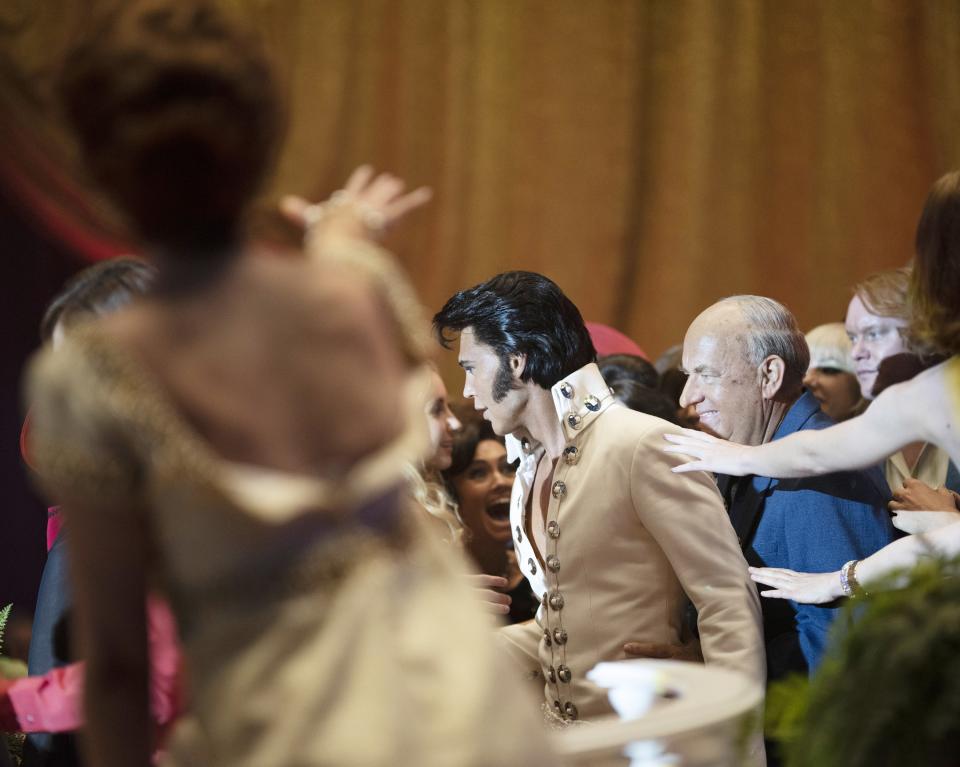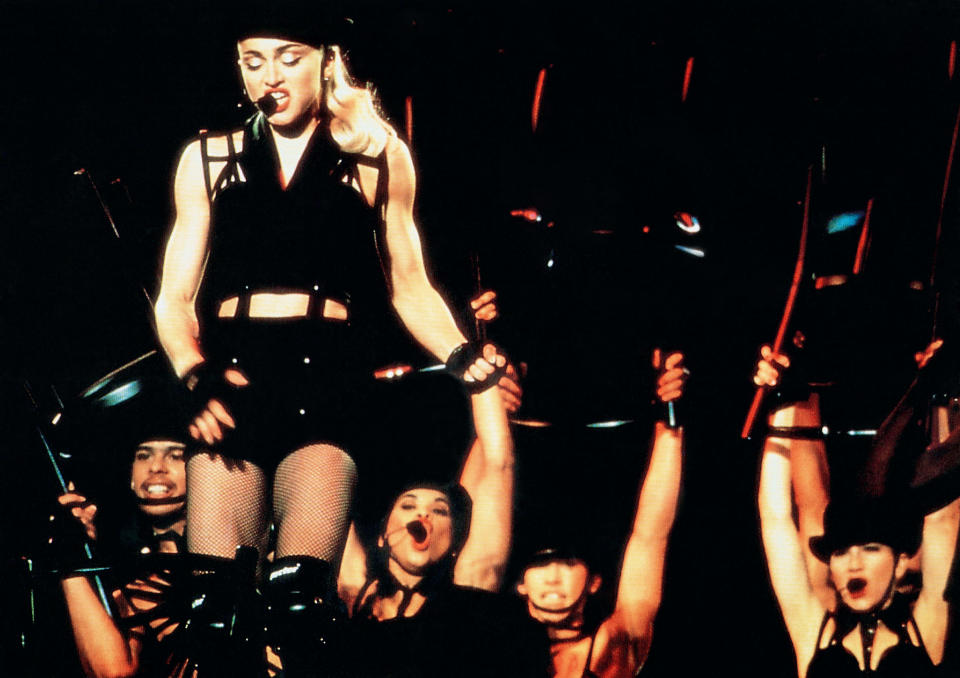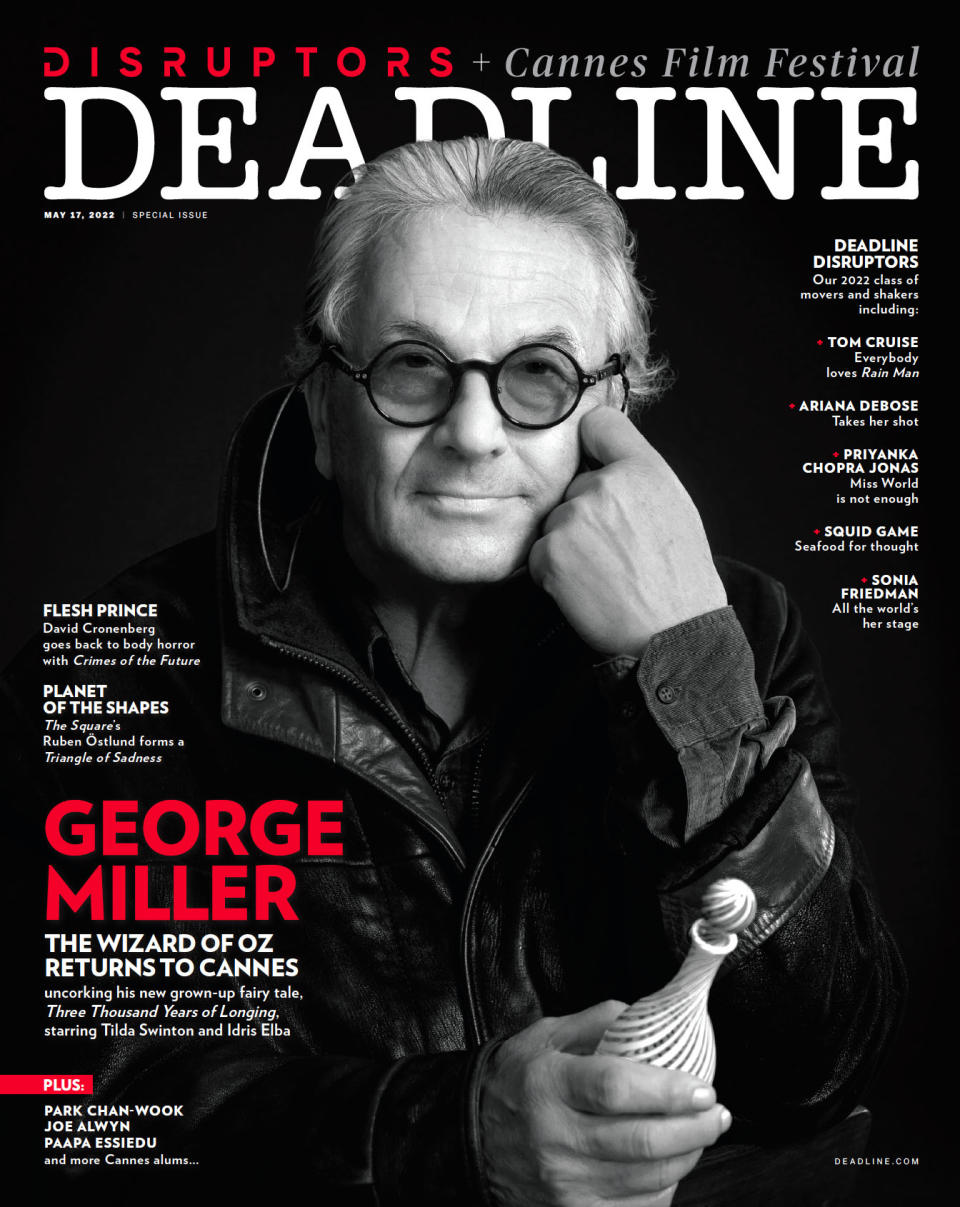From The Rolling Stones To The Spice Girls: The Greatest Musical Moments In Cannes Film Festival History

In 1971, the Cannes Film Festival opened with a screening of Gimme Shelter by Albert and David Maysles, an immersive, vérité depiction of two weeks in the touring life of the Rolling Stones. If that was all it did, it might have been forgotten by now. But by a terrible freak of chance, the filmmakers followed the band to the most notorious concert of their entire career — the Altamont Speedway Free Festival in Livermore, CA, where the Stones, along with Santana, Jefferson Airplane, The Flying Burrito Brothers and Crosby, Stills, Nash & Young, were set to perform a free concert for 300,000 people on Dec. 6, 1969. “We didn’t know what it was going to be,” Albert said later. “We just had a childish faith that having seen the Stones and getting along with them, there might be a feature film there.”

Hugh Stewart/Warner Bros./Courtesy Everett Collection
More from Deadline
At the apparent suggestion of Jefferson Airplane and the Grateful Dead (who were originally set to perform at the festival but ended up steering clear due to serious concerns about violence), the Stones had the bright idea to hire Hell’s Angels to police it, a calamitous decision that would lead to chaos and even murder. Gimme Shelter juxtaposed the devilish high of the band’s performance with Mick Jagger’s ashen face as he later watches — and rewatches — blurry footage of the incident on a Moviola. When the documentary finally unspooled on the Croisette, one of the audience members was the Beatles’ John Lennon, who was quoted as saying, “My God, this was a real film… not any of that intellectual shit!”
No offense to Lennon, but those so-called “real films” have always held a special place at Cannes. This year’s festival, in fact, features three rock and roll entries. Playing Out of Competition is Baz Luhrmann’s Elvis, a gold lamé fever dream of the star’s rise to fame that promises to be as subtle as the director’s hip-hop take on 2013’s opener, The Great Gatsby. In Special Screenings is Jerry Lee Lewis: Trouble in Mind, Ethan Coen’s portrait of Presley’s surly rockabilly rival. And for the Midnight crowd is Brett Morgen’s Moonage Daydream, an “experiential cinematic odyssey” crafted from thousands of hours of live performances by David Bowie. (Bowie is unusual in Cannes history, having also acted in at least two Competition entries — 1983’s Merry Christmas, Mr Lawrence and 2002’s Twin Peaks: Fire Walk With Me — and he had signaled an interest in being on the jury not long before health issues ruled it out.)
Rock music found its way to Cannes in 1967, when Michelangelo Antonioni’s Blowup entered the competition two months after its premiere in swinging London. The mystery thriller that starred David Hemmings as a photographer who may have accidentally photographed a murder also featured live footage of the Yardbirds in a studio-built replica of the London’s cool nightspot The Ricky-Tick. The ecstatic performance by Jimmy Page and Jeff Beck on guitar with Keith Relf on vocals comes to a halt in the film when Beck, annoyed by a buzz in his amplifier, smashes his guitar on stage and throws its neck into the crowd. A riot ends up breaking out, an eerie presage of the Stones’ experience in Gimme Shelter.

Courtesy Everett Collection
Two years later came Dennis Hopper’s Easy Rider, the story of a drug-fueled biker odyssey across America. The filmmakers, who wore black ties with Civil War suits instead of tuxedos to the premiere, were as rock and roll as the film’s needle drops — a bespoke mix of the Band, the Byrds, the Jimi Hendrix Experience and Steppenwolf, topped off with a theme song (“Ballad of Easy Rider”) co-written by Bob Dylan. Thanks to its depiction of the cocaine trade and marijuana and LSD use, the film was promptly banned — no mean feat in permissive France.
Easy Rider also began the trend of the curated soundtrack, which not only sent the cost of music licensing through the roof but influenced every would-be auteur going forward. None of these films could ever be mistaken as rock musicals, but what would Martin Scorsese’s Mean Streets (Directors’ Fortnight, 1974) be without the crashing chords of the Stones’ “Jumpin’ Jack Flash” or Phil Spector’s thunderous intro to The Ronettes’ “Be My Baby”? Would Francis Ford Coppola’s 1979 Palme d’Or winner Apocalypse Now have endured without the Doors’ anthemic “The End” playing over the opening shots of a helicopter attack on Vietnam? And would Quentin Tarantino’s 1994 Palme d’Or winner Pulp Fiction be the same film without Dick Dale’s “Misirlou”, Dusty Springfield’s “Son of a Preacher Man”, and Urge Overkill’s “Girl, You’ll Be a Woman Soon”?
Rock musicals have since cemented their place on the Croisette, as was shown by the opening choice in 2021 — Leos Carax’s Annette, a bizarre fantasy that was co-scripted with American art-rockers Sparks, about a child gifted with an ethereal singing voice. But for an Annette to run, it took a Tommy to walk. 46 years earlier, The Who’s satirical operetta-cum-fantasy drama screened Out of Competition at Cannes. Though it featured dynamos like Tina Turner, Elton John and Eric Clapton, it is likely the festival was more drawn to renowned British director Ken Russell’s bizarre visual quirks than Roger Daltrey’s performance as, “a deaf, dumb, and blind kid [who] sure plays a mean pinball.” But the precedent had been set: seven years later, the same slot was taken by Pink Floyd: The Wall, directed by Alan Parker and starring the Boomtown Rats’ Bob Geldof as a tortured rock star dealing with severe mental illness. Both Tommy and The Wall were based on concept albums, a now largely dated concept that was revisited by Todd Haynes with his 1998 Competition entry Velvet Goldmine, a mash-up retelling of the story of glam rock that, like its subject, proved to be several years ahead of its time.

Miramax/Courtesy Everett Collection
Given that Cannes is better known in the wider world for its star-studded excess rather than its films, few rock or pop stars have dared try to use the festival for promotional purposes; indeed, it would take an icon of huge international proportions to risk it. Madonna was one of the few to chance it, with 1991’s Madonna: Truth or Dare (AKA In Bed with Madonna), and the perfectly executed result knocked everything else off the world’s front pages. “With jet-black curls and cloaked in pink satin,” wrote The Times of London, “Madonna climbed the stairs of the Palais des Festivals with the air of a demure geisha girl. She then dropped her cloak to reveal nothing underneath but conical bra and knickers. There was a collective gasp and one onlooker mused, ‘Cannes hasn’t seen anything like this since Brigitte Bardot in 1963.’”
It was a tough act to follow, but nevertheless the Spice Girls tried in 1997, arriving at the festival by boat, wearing headscarves to pay tribute to the exquisite Grace Kelly (who fortunately, by then, was no longer alive to see it). With no film in the can yet — it would be made and rushed out in time for Christmas — the band made a public appearance on the canopy over the entrance of the Martinez hotel, over half a mile from the Palais. Stunts like that have been few and far between ever since; in 2002 the cast of Michael Winterbottom’s rave-era comedy 24 Hour Party People narrowly escaped arrest for throwing fake dead pigeons at diners on the Majestic Beach. Much better just to perform, as U2 did, on the steps of the Palais in support of their 2007 concert film U2 3D, or on Carlton Beach, as Elton John did with Taron Egerton to plug his 2019 autobiography Rocketman.

But the safest way to launch a music title in the festival’s official selection is via the documentary route. Although docs per se are by no means the festival’s specialty, over the last decade or so, Cannes has shown itself as a good place for conversations about pop culture. Which is why Asif Kapadia’s Amy, a thoughtful study of ill-fated singer Amy Winehouse, debuted there, sparking questions of fame and exploitation that continued to be addressed three years later in Kevin Macdonald’s searing doc Whitney, which looked at the lessons (not) learned from the death of R&B singer Whitney Houston. But it doesn’t all have to be doom and gloom: Jim Jarmusch’s 2016 film Gimme Danger ended with its subject, Iggy Pop, alive and healthier than ever, while Todd Haynes’ The Velvet Underground in 2021 bade a dignified farewell to the unlucky New York band.
It might be a tough time for artists in the music world, with the increase in streaming and the decrease in royalties and rights. And in many ways, making a go of it at Cannes is not much easier. But the possibilities are there — or as Mick Jagger would sing it, they’re “just a shot away”.
Best of Deadline
Sign up for Deadline's Newsletter. For the latest news, follow us on Facebook, Twitter, and Instagram.


